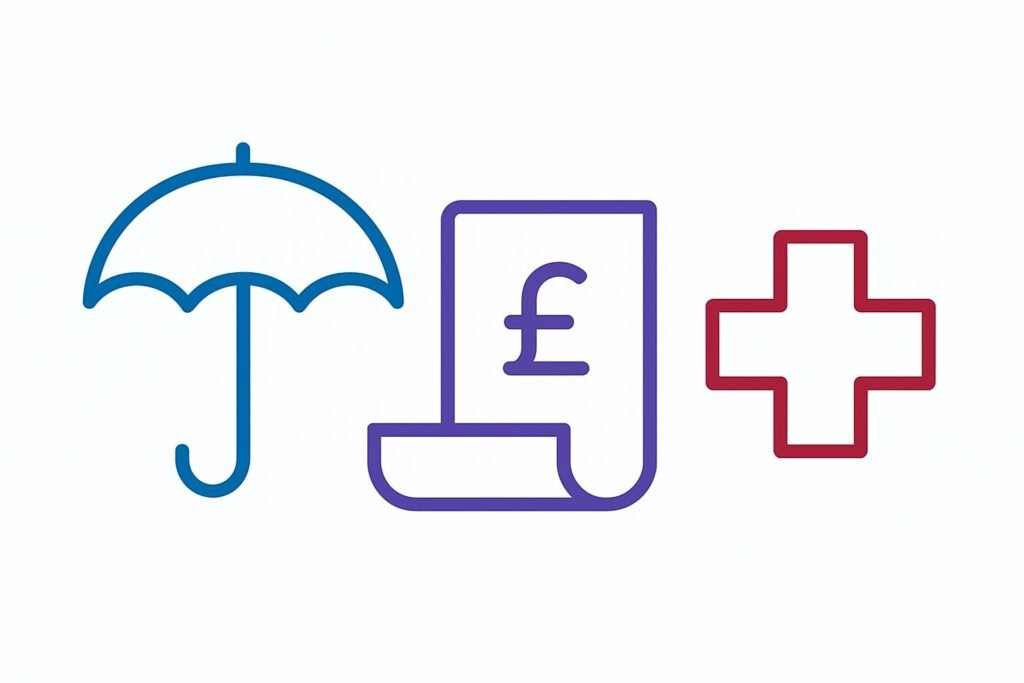
If you run your own limited company, you will be aware that you alone are responsible for protecting yourself should you be unable to work in the future.
An executive income protection policy can provide peace of mind, as well as tax efficiency, as the premiums can typically be funded by your limited company. You might also want to compare this with life insurance for directors, which offers different tax advantages.
In this article, we explain what income protection is and how your limited company can fund the costs.
What is income protection?
This type of policy will protect your income should you be unable to carry out your usual work, as a result of an injury or illness.
It is a worthwhile addition to Statutory Sick Pay, which all employees are entitled to. Unfortunately, SSP is a mere £118.75 (as of May 2025) per week and is paid by your employer (your limited company) for up to 28 weeks.
Of course, this level of income replacement is unlikely to be enough for most company directors.
This is where the concept of income protection comes in.
What does this type of policy cover?
Income protection will pay you an income during times when you are unable to work due to sickness or disability. For contractors, income protection can be especially valuable, as there is rarely any other safety net in place.
You will continue to receive payments until you have recovered, retired, or your claim period expires—whichever happens first.
IP cover will typically exclude some pre-existing conditions, self-harm, or illness which results from the misuse of alcohol or other substances.
You will be able to choose the type of cover the policy includes – the most common choices are:
- Level cover – this means that the amount of protection remains the same throughout the term, with no inflationary increases.
- Inflation-linked cover – as the name suggests, the amount of cover will increase annually, according to the inflation times by a multiple.
You can choose how quickly your policy comes into play, as well as the policy term – often until retirement.
Personal vs. Limited Company – how are the premiums taxed?
If you are a traditional employee or a sole trader, all costs for things like life insurance or income protection are paid for out of your post-tax personal income.
However, if you run your own limited company, the business can access protection products, such as relevant life insurance, as well as income protection cover, which can be funded via the company itself.
As certain products can be offset by your company against Corporation Tax, this is tax-efficient from the company’s perspective.
From the director’s perspective, the policy is owned and paid for by the company, so no benefit-in-kind charge arises. This means there are no Employer or Employee National Insurance liabilities, and no personal income tax to pay on the premiums.
How are any payouts taxed?
The limited company is the policyholder for executive plans, and an employee is the person insured.
The company will receive any income from the policy when a successful claim is made. Importantly, this income is treated as trading income and is subject to tax when it is distributed.
For personal cover, you have already paid for any premiums out of post-tax income, so any payouts are not taxed further.
Clearly, there is a tax benefit to setting up income protection through your company rather than paying personally; however, you should ask your financial adviser or accountant for a comprehensive illustration tailored to your own personal circumstances.
How much protection can I take out?
Executive protection policies will typically cover you for up to 80% of your income (in a combination of salary and dividends, plus possibly overtime and the value of any P11d benefits).
This compares favourably to personal plans, which typically cover only up to 65% of your income.
However, the proceeds of a successful executive policy claim are taxable, whereas those from a personally funded policy are not.
Some leading providers in the market can protect up to £25,000 per month for level cover, and more if the cover is inflation-linked.
It may also be possible to include the value of your spouse’s dividends, although conditions will be attached, such as that the spouse only performs minimal administrative duties.
You need to choose your deferred period, which is the amount of time before the policy starts to pay out. This can typically range from 7 days to a year. For obvious reasons, the longer the deferred period, the lower your premiums will be.
Things to consider when taking out cover
- When working out how much cover you need, it is worth ‘grossing up’ the potential payout received by the company in the event of a successful claim. You can then work out the amount you (the employee) will receive after tax.
- Ensure that your cover is provided on an own occupation basis.
- Consider the deferred period carefully and how long you would like the cover to run for, as these variables can considerably affect the premium level.
- In the current climate, it may be sensible to consider inflation-linked cover!
- Make sure you approach an IFA that specialises in the needs of limited company owners. They will understand the intricacies of how directors operate in practice, as well as how premiums and payouts are taxed.
Directors may also want to read our guide to income protection for the self-employed, which covers how these policies work outside of a limited company structure.
Get in touch with our trusted partner
We’ve worked with Broadbench, a leading IFA, for over eight years. They specialise in protection for limited company directors and have arranged cover for hundreds of our readers.
Complete the form below and their team will respond within 24 hours (Mon–Fri).
When you click ‘submit’, your details are sent securely to the Broadbench income protection team. They will not be used for any other purpose.



